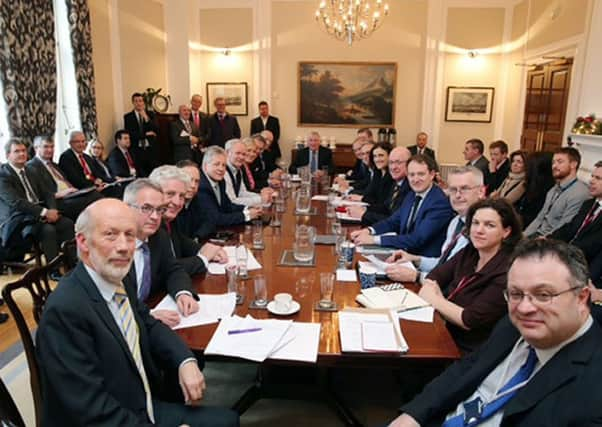John Kerry hopes for peace after deal


Marathon negotiations in Belfast involving the ministerial Executive’s five parties and the UK and Irish governments concluded yesterday.
The Stormont House Agreement, forged after 11 weeks of discussions, has resolved destabilising wrangles over the administration’s budget and its non-implementation of welfare reforms while establishing new structures to deal with the legacy of unsolved Troubles killings.
Advertisement
Hide AdAdvertisement
Hide AdIt achieved less progress on other vexed disputes over the flying of flags and parading, but did set out new processes to examine how to find solutions to those matters in the future.
CONNECT WITH THE SCOTSMAN
• Subscribe to our daily newsletter (requires registration) and get the latest news, sport and business headlines delivered to your inbox every morning
Mr Kerry said: “I commend the parties for working together through some very contentious issues - and finding solutions that will promote a more peaceful and hopeful future for the people of Northern Ireland.”
US president Barack Obama and Prime Minister David Cameron have also praised the deal.
Much of the plan has been facilitated with a £2 billion financial package from the UK Government - an offer that combines some new money from the Treasury with enhanced borrowing access and flexibility.
Mr Kerry said: “This is statesmanship, pure and simple, and leadership by all parties to break a political impasse and avoid a fiscal crisis by resolving complex budgetary and welfare issues.
“The agreement reforms institutional arrangements, which will improve governance in Northern Ireland, and advances Northern Ireland’s peace process by establishing new institutions to deal with the often-divisive legacy of the past.”
He said those institutions included a historical investigations unit, an independent commission for information retrieval, an implementation and reconciliation group, and an oral history archive.
Advertisement
Hide AdAdvertisement
Hide AdHe said agreement on legacy issues was based largely on negotiations led last year by former special envoy for Northern Ireland Richard Haass, which broke up a year ago without success.
The deal overcomes nationalist concerns about welfare reform by enabling the Executive to establish and finance its own top-up fund to support those who will lose benefits when the policies are introduced.
The dispute, and accompanying multimillion-pound Treasury penalties for non-implementation, had threatened the future of the institutions.
While the Executive is still facing a hefty penalty to cover the period when reforms have not been in operation, the sum is much reduced on the £200 million-plus bill it was facing.
The deal will enable ministers to balance the budget in the coming financial year.
Around £700 million of the loan will fund a major public sector restructuring reform programme, which includes a voluntary redundancy scheme.
This proposal is part of efforts to rebalance an economy traditionally over-reliant on state jobs.
The Executive has also been granted the power to set its own rates of corporation tax in an effort to stimulate private sector growth.
Advertisement
Hide AdAdvertisement
Hide AdThis will enable it to better compete for foreign direct investment with the much lower rate of business tax in operation in the Republic of Ireland.
The document sets out steps reducing the number of Executive departments and Assembly members.
New mechanisms, supported by £150 million from the Government, will investigate historic Troubles killings, taking the place of police and the independent police ombudsman. Legacy inquests will remain with the coroners’ courts.
The talks process culminated with a final 30-hour round of negotiations that saw politicians talk through the night at Stormont House.
The discussions were chaired by Northern Ireland Secretary Theresa Villiers. Irish Foreign Affairs Minister Charlie Flanagan was also involved throughout.
Mr Cameron and Irish premier Taoiseach Enda Kenny took part in an intensive session of talks in Belfast earlier this month.
SCOTSMAN TABLET AND IPHONE APPS